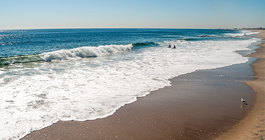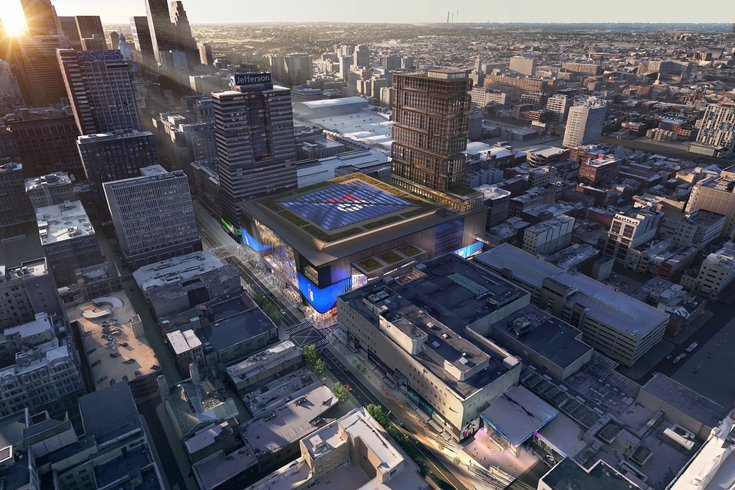
September 27, 2024
 Provided Image/Gensler
Provided Image/Gensler
Last year, the 76ers said they would build a 395-unit residential tower as part of the development of the team's proposed arena on Market Street. That plan may not move forward as City Council tweaks legislation for the arena. Housing and retail developments could instead be headed to Market Street.
The residential tower included in the 76ers arena proposal may not get built — even if the rest of the project in Center City moves forward. As the team's proposal is vetted by members of City Council, other housing and retail investments on Market Street could take precedence over the team's plan.
At Wednesday night's public meeting on the arena, Mayor Cherelle Parker and members of her administration made no mention of the 395-unit tower as they discussed the city's deal with the team and a $50 million community benefits agreement. Instead, city officials talked about adding residential units on the south side of Market Street that would face the new arena between 10th and 11th streets. Later phases of the development would bring more housing projects to lots on Market Street east of the arena.
MORE: SEPTA to install taller fare gates at 9 more subway stations next year
Last year, the Sixers released renderings of the proposed tower at the site of the former Greyhound bus station at 10th and Filbert Streets, on the north end of the arena site. The team said the $250 million project would reserve 20% of its units for affordable housing. At the time, the Sixers did not specify the income ranges of the affordable units, and the arena site is not zoned to require them. Most mixed-income housing developments calculate rents for affordable units based on a percentage of the area median income.
Among the concerns raised by opponents of the arena is the fear that it will increase real estate values in the area, eventually putting residents and businesses at risk of displacement by driving up costs.
"Chinatown has issues beyond an arena. Whether the arena happens or not, we need to be able to build more affordable housing in Chinatown," Andy Choi, a leader at the Philadelphia Association of Community Development Corporations, said earlier this month. "The population ... of Asian Americans and Chinese has been dropping. I think that's a real concern."
City Councilmember Mark Squilla, whose First District includes the arena site, told reporters at City Hall on Thursday that the proposed residential tower has been unpopular with his constituents.
"My colleagues in Chinatown are really opposed to that housing development on top of the arena," Squilla said.
Although the 76ers thought the tower would be well-received as a source of affordable homes, Squilla said he's been told the opposite.
"They took that as a middle finger to Chinatown that we don't specifically want the arena, but building that housing unit itself on top of the arena was even a worse scenario, saying you're doing something for us," he said. "So I've been working with the development team to remove that piece from the project."
A spokesperson for the 76ers declined to comment about the residential tower, saying the team looks forward to reviewing Squilla's feedback.
The Parker administration's presentation detailed plans for multiple other residential and retail projects along Market Street. One calls for 380 housing units and retail space at two lots on the 1000 block of Market Street, which would be built starting in 2027. Another would bring 340 units and retail to another lot on the 900 block of Market Street.
City officials also revealed preliminary plans for a hotel with 400 to 600 rooms to be built on a parking lot at the southwest corner of Eighth and Market streets. The lot is sometimes called the "Disney Hole" because in the 1990s it was the planned site of a Disney indoor theme park that never came to fruition. It also had been floated as a possible site for a casino in the mid-2000s. The hotel project would be led by Montgomery County-based developer the Goldenberg Group.
The legislative package put forward by the Parker administration will not be formally introduced in City Council until Oct. 24, at the earliest, to allow all stakeholders to review the proposal.
Squilla gave no indication of where he leans on the arena proposal, saying he plans to continue hearing from constituents and working on the legislation in partnership with the 16 other members of City Council. Squilla's vote on the arena is viewed as pivotal to the project getting approved, since City Council historically has deferred to individual members about land-use in their respective districts.
Additional public hearings will be held during City Council's review of the legislation.
"We'll have to go through that process and amend it further if necessary before a final vote will take place," Squilla said.
Anne Kelly, Squilla's chief of staff, said Friday that housing will be a strong focus during City Council's review of the arena proposal and potential development projects around it. She said detailed plans will be released to the public.
"(Squilla) strongly supports housing on the east Market Corridor and working with the stakeholders to address that need potentially using the stretch of vacant properties along east Market," Kelly said. "He has identified other properties in the area for possible development, that would include an affordable housing component."
At a packed town hall meeting Parker hosted earlier this month, some Chinatown leaders stressed the importance of affordable housing as a commitment for the neighborhood.
On Wednesday, Parker said the community benefits agreement for the arena will include $25 million for neighborhoods directly impacted by the project and $25 million for citywide programs. The citywide portion allocates $3 million for city housing programs including affordable housing preservation, senior housing and homeownership assistance.
At the town hall, Choi said Parker has made assurances about housing in Chinatown.
"The mayor has committed to help us, whether this arena happens or not, but we will look for other places where we can build more housing for people in the community and make an even stronger community," Choi said. "Having worked in community development, we go by the manta, 'retail follows rooftops,' which means if you have a strong community of residents, you actually build the community of retail, restaurants and businesses."
The Sixers hope to get the 18,500-seat arena approved by the end of the year, setting up a timeline that would have the facility completed in August 2031.